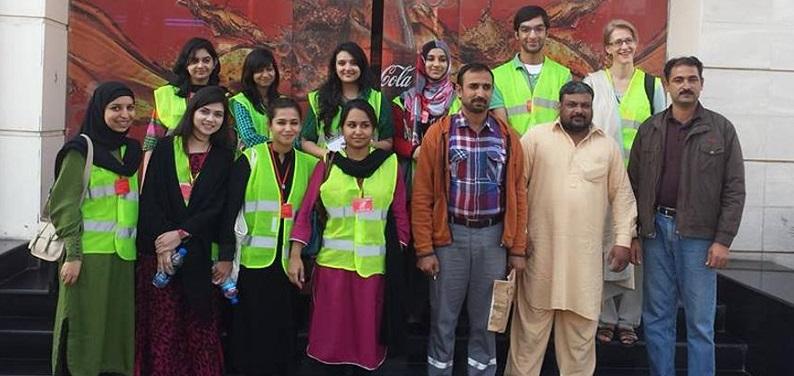
“Jo darr tha jo khauf tha who chala gaya! (Any fears I had have disappeared!)” exclaimed a worker in the Lahore factory of Coca Cola Beverages Pakistan Ltd., expressing his faith in his labor union.
Participants of the LUMS "Topics in Labour Economics" (ECON 318) course visited the Coca Cola factory in Lahore. This worker’s optimism – amongst others - did much in radically changing ideas about the role of unions in Pakistan, among the students. The work of the Lahore Coca Cola factory union was learned about during the exposure visit, demonstrated that not all is blue in the Pakistani labor market and that struggle, perseverance, discipline and mutual respect bears fruit for both the laborers and the company.
The union had a long history of struggle, which showcased in early 2000 when the labor union was banned due to unaccommodating management and unfruitful negotiation. With a new management in place since 2010, the revitalised labor union has worked towards a procedural and institutional framework, which guaranteed effective social dialogue between factory workers and management. Legal obligations on the part of the management along with procedural obligations on the side of union, to align their demands with the needs of the company, promoted dialogue and fruitful negotiation.
The activities of the union accrued real benefits for factory workers. They include health insurance, seasonal holiday guarantees, the promise of job security and other insurance mechanisms. Besides, the increased dialogue has instilled a sense of ownership of the factory’s production processes. Workers expressed great pride in being union members and even greater confidence in the union leadership.
Theoretical discussions from class about the positive role of social dialogue for the flow of information and productivity came to life for the LUMS students in encounters with various stakeholders in the factory. An interview with a middle-management chemist at the factory illustrated the motivating effects of job security. According to him, it translates into benefits for the enterprise, supporting the theoretical claim that the presence of social dialogue benefits labour rights and productivity simultaneously. The factory union’s President, Mr. Nasrullah, emphasised how the guarantee of union rights has promoted the flow of information from higher management to factory workers and vice versa. This helps the management in conveying information to workers, but also provides a channel for the communication of employees’ concerns to the management. The Human Resources Manager Mr. Qaiser Saeed confirmed this when he stated that: “This union is our business partner”.
During the visit, students witnessed union members contributing to improvements of the production process, opening the possibility of valuable innovations in the factory’s operations. The revitalised union leadership played a vital role for workers’ confidence in and the management’s respect for the union. Charismatic leadership seems to be crucial for the formation and sustainability of beneficial trade unions in the Pakistani context.
Significant positive change had been brought about by social dialogue at the Coca Cola factory. As the country continues to confront dismal labor organisations and appalling working conditions for the majority of the Pakistani labour force, the course students left with a distinct spark of hope.
Report by: Mahrokh Humayun, Nisa Paracha, Saad Hafeez, Karin Astrid Siegmann (course leader)







